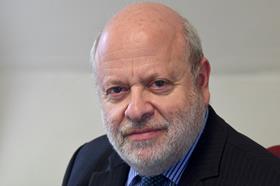
The Law Society has assisted the profession through the upheavals of the last few years by providing, on each occasion, resources for solicitors. It started with Brexit, moved on to the coronavirus pandemic, and now we are at the Russian invasion of Ukraine.
Each development has had multiple consequences for the profession. The repercussions from the invasion of Ukraine are several, and still working themselves out: the retreat of law firms from Russia, the storm over SLAPPs (resulting in last week’s Law Society response to the government’s call for evidence), and the current difficulties over sanctions, both in acting for sanctioned individuals and in the possibility that sanctions on providing services to Russia might be extended to include legal services.
A common question from lawyers is what they can individually do to help, to avoid looking on helplessly as Russia trashes areas of Ukraine.
Some may want to give money. The Law Society’s webpage refers readers either to the web-page of the Ukrainian National Bar Association (UNBA), which contains more information, or to major charities running appeals. For those more interested in a benefit in kind, there is a reference to the Homes for Ukraine scheme.
The Ukraine web-page of the Council of Bars and Law Societies of Europe (CCBE) is much more upfront about money. (Most self-respecting bars have Ukraine web-pages these days, usually with an expected statement condemning Russian aggression. The CCBE has even written to the Prosecutor of the International Criminal Court (ICC) offering to assist him with his investigation – see more on the investigation below.)
Regarding money, the CCBE says:
‘The Ukrainian National Bar Association has made a call for donations to support the Ukrainian lawyers and their families. The aid will be distributed by the Charity Foundation of the National Bar Association of Ukraine (100% owned by the National Bar Association of Ukraine) to those lawyers who need it the most, including those who have lost their homes, been injured, have no means of subsistence. A Board of Trustees will prepare and publish a report on the use of these funds.’
There is an e-mail contact given, and the UNBA’s own web-page gives more detail of where money so far has gone - for instance to two lawyers from Mariupol and Mykolayiv who received serious injuries while participating in hostilities, to children of large families, and to elderly lawyers.
The American Bar Association, on the other hand, encourages financial donations to its existing Rule of Law Initiative to ‘support individuals and local civil society organizations to contribute to evidence collection of atrocity and war crimes in real-time as the Russian invasion into Ukraine unfolds’.
For those wishing to give more direct specific legal help, the Law Society refers solicitors to the Ukraine Justice Alliance, which brings together law firms and lawyers from Europe and the USA to provide a platform through which legal expertise can be delivered.
On the topic of immigration advice alone, there is also the Ukraine Advice Project UK, which is a group of volunteer legal professionals connecting Ukrainian refugees with free legal advice on UK immigration, visas and asylum.
The CCBE has a database of those providing a similar service in other European countries.
For those wishing to give direct legal assistance to victims, the ICC has a very useful page.
Although neither Russia nor Ukraine are signatories to the Rome Statute, which established the ICC, the Ukrainian government lodged a declaration accepting ICC jurisdiction over alleged crimes committed from 20 February 2014 onwards on Ukrainian territory, on an open-ended basis. Various state parties have referred the war in Ukraine to the ICC, and the Prosecutor announced he had opened an investigation on 2 March 2022. There is a dedicated portal through which anyone with relevant information on what the ICC calls ‘the Ukraine situation’ can contact ICC investigators.
Interestingly, the Ukraine Justice Alliance, mentioned above, supports Ukraine's campaign for the creation of a Special Tribunal for the Punishment of the Crime of Aggression against Ukraine. The jurisdiction of this Special Tribunal would be complementary to the ICC’s jurisdiction and the current Prosecutor's investigation.
There is now training for lawyers on various aspects of legal help for Ukraine. For instance, assistance to victims is a specialised area. The victims themselves will often be severely traumatised. The evidence must not be contaminated, must be properly documented, and then presented to the ICC in a manner useful to a future court hearing.
Unaccompanied children is another specialist area, on which there is available guidance.
The possibilities are many. There is no single web-page which provides all the information, but with a few clicks you can find the means to give the assistance that most suits your wishes.
Jonathan Goldsmith is Law Society Council member for EU & international and a former secretary general of the Council of Bars and Law Societies of Europe. All views expressed are personal and are not made in his capacity as a Law Society Council member, nor on behalf of the Law Society






























